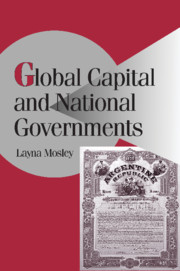Book contents
- Frontmatter
- Contents
- List of Figures and Tables
- Acknowledgments
- 1 NATIONAL GOVERNMENTS AND GLOBAL CAPITAL: A RECASTING
- 2 FINANCIAL MARKET INFLUENCE ON GOVERNMENT POLICY: THEORY AND HYPOTHESES
- 3 FINANCIAL MARKET INFLUENCE IN DEVELOPED NATIONS: AN EMPIRICAL ASSESSMENT
- 4 FINANCIAL MARKET–GOVERNMENT RELATIONS IN EMERGING MARKETS
- 5 POLITICS MEETS MARKETS: DOMESTIC RESPONSES TO FINANCIAL MARKET PRESSURES
- 6 ALTERNATIVE DOMESTIC RESPONSES: CHANGES TO FINANCIAL MARKET–GOVERNMENT RELATIONS
- 7 HISTORY REPEATING ITSELF? FINANCIAL MARKETS AND NATIONAL GOVERNMENT POLICIES BEFORE THE FIRST WORLD WAR
- 8 FINANCIAL MARKET–GOVERNMENT RELATIONS IN THE TWENTY-FIRST CENTURY
- APPENDIX 2.1 FINANCIAL MARKET INTERVIEWS
- APPENDIX 3.1 DATA DEFINITIONS AND SOURCES
- APPENDIX 3.2 FULL RESULTS FOR MACROINDICATORS MODEL
- APPENDIX 4.1 THE COMPONENTS OF THE SDDS
- APPENDIX 4.2 RATING AGENCY METHODOLOGIES
- APPENDIX 4.3 RATING AGENCY OUTCOMES, 1997
- APPENDIX 6.1 NATIONS IN CAPITAL CONTROLS DATA SET
- References
- Index
- Titles in the series
1 - NATIONAL GOVERNMENTS AND GLOBAL CAPITAL: A RECASTING
Published online by Cambridge University Press: 14 January 2010
- Frontmatter
- Contents
- List of Figures and Tables
- Acknowledgments
- 1 NATIONAL GOVERNMENTS AND GLOBAL CAPITAL: A RECASTING
- 2 FINANCIAL MARKET INFLUENCE ON GOVERNMENT POLICY: THEORY AND HYPOTHESES
- 3 FINANCIAL MARKET INFLUENCE IN DEVELOPED NATIONS: AN EMPIRICAL ASSESSMENT
- 4 FINANCIAL MARKET–GOVERNMENT RELATIONS IN EMERGING MARKETS
- 5 POLITICS MEETS MARKETS: DOMESTIC RESPONSES TO FINANCIAL MARKET PRESSURES
- 6 ALTERNATIVE DOMESTIC RESPONSES: CHANGES TO FINANCIAL MARKET–GOVERNMENT RELATIONS
- 7 HISTORY REPEATING ITSELF? FINANCIAL MARKETS AND NATIONAL GOVERNMENT POLICIES BEFORE THE FIRST WORLD WAR
- 8 FINANCIAL MARKET–GOVERNMENT RELATIONS IN THE TWENTY-FIRST CENTURY
- APPENDIX 2.1 FINANCIAL MARKET INTERVIEWS
- APPENDIX 3.1 DATA DEFINITIONS AND SOURCES
- APPENDIX 3.2 FULL RESULTS FOR MACROINDICATORS MODEL
- APPENDIX 4.1 THE COMPONENTS OF THE SDDS
- APPENDIX 4.2 RATING AGENCY METHODOLOGIES
- APPENDIX 4.3 RATING AGENCY OUTCOMES, 1997
- APPENDIX 6.1 NATIONS IN CAPITAL CONTROLS DATA SET
- References
- Index
- Titles in the series
Summary
More recently, however, as the downward-ratcheting logic of electoral politics has placed a death grip on their economies, they [states] have become – first and foremost – remarkably inefficient engines of wealth distribution. … Moreover, as the workings of genuinely global capital markets dwarf their ability to control exchange rates or protect their currency, nation-states have become inescapably vulnerable to the discipline imposed by economic choices made elsewhere by people and institutions over which they have no practical control. … Second, and more to the point, the nation-state is increasingly a nostalgic fiction.
For creditor states, global finance is an opportunity moderated by a measured risk. For debtor states, it can be the new tyrant.
When throngs of protestors mobilized around the Free Trade Area of the Americas (FTAA) summit in Quebec, the World Bank/International Monetary Fund (IMF) meetings in Washington and Prague, and the World Trade Organization (WTO) ministerial meetings in Seattle, their target was economic globalization. Although these activists represented a variety of interests and viewpoints, they shared a refrain: a narrow set of political elites, corporations, and investors were directing globalization and global economic institutions, making them unaccountable and inherently undemocratic. In the financial realm, protestors contend that government economic policies are chosen largely by an “electronic herd.” This herd represents the twenty-first century analog to the British prime minister Harold Wilson's “gnomes of Zurich” (an epithet for Swiss currency traders, said to necessitate the 1967 devaluation of the pound) and to the 1980s' “bond market vigilantes.”
- Type
- Chapter
- Information
- Global Capital and National Governments , pp. 1 - 24Publisher: Cambridge University PressPrint publication year: 2003



